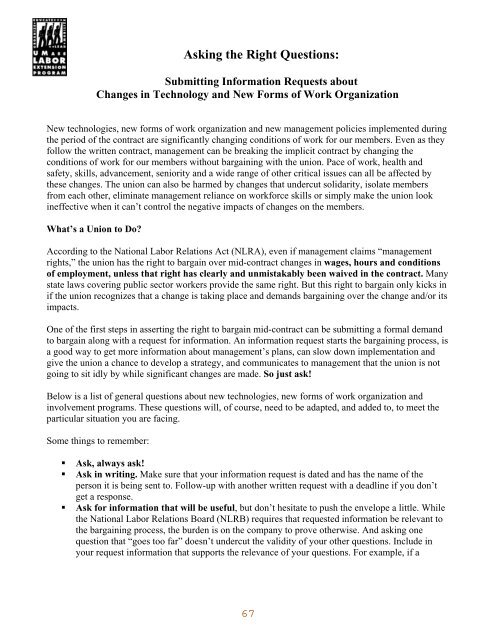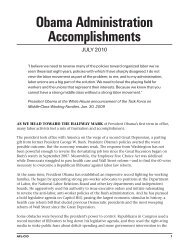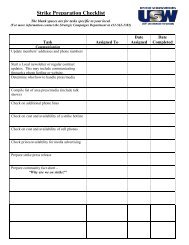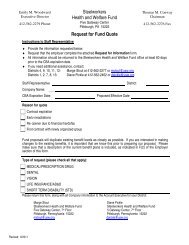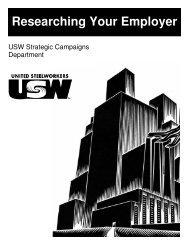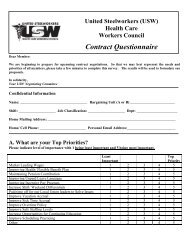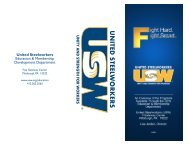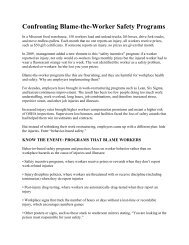Union Approach to Health and Safety: - United Steelworkers
Union Approach to Health and Safety: - United Steelworkers
Union Approach to Health and Safety: - United Steelworkers
You also want an ePaper? Increase the reach of your titles
YUMPU automatically turns print PDFs into web optimized ePapers that Google loves.
Asking the Right Questions:<br />
Submitting Information Requests about<br />
Changes in Technology <strong>and</strong> New Forms of Work Organization<br />
New technologies, new forms of work organization <strong>and</strong> new management policies implemented during<br />
the period of the contract are significantly changing conditions of work for our members. Even as they<br />
follow the written contract, management can be breaking the implicit contract by changing the<br />
conditions of work for our members without bargaining with the union. Pace of work, health <strong>and</strong><br />
safety, skills, advancement, seniority <strong>and</strong> a wide range of other critical issues can all be affected by<br />
these changes. The union can also be harmed by changes that undercut solidarity, isolate members<br />
from each other, eliminate management reliance on workforce skills or simply make the union look<br />
ineffective when it can’t control the negative impacts of changes on the members.<br />
What’s a <strong>Union</strong> <strong>to</strong> Do?<br />
According <strong>to</strong> the National Labor Relations Act (NLRA), even if management claims “management<br />
rights,” the union has the right <strong>to</strong> bargain over mid-contract changes in wages, hours <strong>and</strong> conditions<br />
of employment, unless that right has clearly <strong>and</strong> unmistakably been waived in the contract. Many<br />
state laws covering public sec<strong>to</strong>r workers provide the same right. But this right <strong>to</strong> bargain only kicks in<br />
if the union recognizes that a change is taking place <strong>and</strong> dem<strong>and</strong>s bargaining over the change <strong>and</strong>/or its<br />
impacts.<br />
One of the first steps in asserting the right <strong>to</strong> bargain mid-contract can be submitting a formal dem<strong>and</strong><br />
<strong>to</strong> bargain along with a request for information. An information request starts the bargaining process, is<br />
a good way <strong>to</strong> get more information about management’s plans, can slow down implementation <strong>and</strong><br />
give the union a chance <strong>to</strong> develop a strategy, <strong>and</strong> communicates <strong>to</strong> management that the union is not<br />
going <strong>to</strong> sit idly by while significant changes are made. So just ask!<br />
Below is a list of general questions about new technologies, new forms of work organization <strong>and</strong><br />
involvement programs. These questions will, of course, need <strong>to</strong> be adapted, <strong>and</strong> added <strong>to</strong>, <strong>to</strong> meet the<br />
particular situation you are facing.<br />
Some things <strong>to</strong> remember:<br />
• Ask, always ask!<br />
• Ask in writing. Make sure that your information request is dated <strong>and</strong> has the name of the<br />
person it is being sent <strong>to</strong>. Follow-up with another written request with a deadline if you don’t<br />
get a response.<br />
• Ask for information that will be useful, but don’t hesitate <strong>to</strong> push the envelope a little. While<br />
the National Labor Relations Board (NLRB) requires that requested information be relevant <strong>to</strong><br />
the bargaining process, the burden is on the company <strong>to</strong> prove otherwise. And asking one<br />
question that “goes <strong>to</strong>o far” doesn’t undercut the validity of your other questions. Include in<br />
your request information that supports the relevance of your questions. For example, if a


